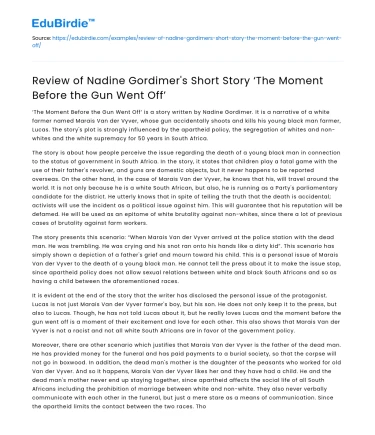‘The Moment Before the Gun Went Off’ is a story written by Nadine Gordimer. It is a narrative of a white farmer named Marais Van der Vyver, whose gun accidentally shoots and kills his young black man farmer, Lucas. The story's plot is strongly influenced by the apartheid policy, the segregation of whites and non-whites and the white supremacy for 50 years in South Africa.
The story is about how people perceive the issue regarding the death of a young black man in connection to the status of government in South Africa. In the story, it states that children play a fatal game with the use of their father's revolver, and guns are domestic objects, but it never happens to be reported overseas. On the other hand, in the case of Marais Van der Vyver, he knows that his, will travel around the world. It is not only because he is a white South African, but also, he is running as a Party's parliamentary candidate for the district. He utterly knows that in spite of telling the truth that the death is accidental; activists will use the incident as a political issue against him. This will guarantee that his reputation will be defamed. He will be used as an epitome of white brutality against non-whites, since there a lot of previous cases of brutality against farm workers.
Save your time!
We can take care of your essay
- Proper editing and formatting
- Free revision, title page, and bibliography
- Flexible prices and money-back guarantee
The story presents this scenario: “When Marais Van der Vyver arrived at the police station with the dead man. He was trembling. He was crying and his snot ran onto his hands like a dirty kid”. This scenario has simply shown a depiction of a father's grief and mourn toward his child. This is a personal issue of Marais Van der Vyver to the death of a young black man. He cannot tell the press about it to make the issue stop, since apartheid policy does not allow sexual relations between white and black South Africans and so as having a child between the aforementioned races.
It is evident at the end of the story that the writer has disclosed the personal issue of the protagonist. Lucas is not just Marais Van der Vyver farmer's boy, but his son. He does not only keep it to the press, but also to Lucas. Though, he has not told Lucas about it, but he really loves Lucas and the moment before the gun went off is a moment of their excitement and love for each other. This also shows that Marais Van der Vyver is not a racist and not all white South Africans are in favor of the government policy.
Moreover, there are other scenario which justifies that Marais Van der Vyver is the father of the dead man. He has provided money for the funeral and has paid payments to a burial society, so that the corpse will not go in boxwood. In addition, the dead man's mother is the daughter of the peasants who worked for old Van der Vyver. And so it happens, Marais Van der Vyver likes her and they have had a child. He and the dead man's mother never end up staying together, since apartheid affects the social life of all South Africans including the prohibition of marriage between white and non-white. They also never verbally communicate with each other in the funeral, but just a mere stare as a means of communication. Since the apartheid limits the contact between the two races. Though, it is just a mere stare, but the feeling is the same when Marais Van der Vyver and Lucas have had the moment before the gun went off.
To sum it up, the story depicts a picture of action-restraint and complicacy of human relationship between whites and non-whites in South Africa due to apartheid policy. It deprives non-white Africans’ power in the government, when the white government strengthened the existing policy about racial segregation. This justifies that the apartheid policy affects people's reaction about relationship and incident like the experience of Marais Van der Vyver to his son, Lucas, and he and the dead man's mother.






 Stuck on your essay?
Stuck on your essay?

